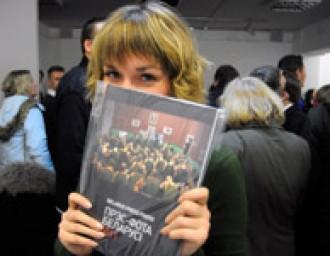Judge declares 2011 Belarus Press Photo book «extremist material»

A book featuring the best pictures selected for the 2011 Belarus Press Photo contest was declared "extremist material" by a judge of the Ashmiany District Court on Thursday.
Judge Aliaksandr Davydau ordered Vadzim Zamirouski, Julia Darashkevich and Aliaksandr Vasyukevich, co-organizers of the contest, to pay 217,500 roubles ($25) each in litigation costs.
In an interview with BelaPAN, Ms. Darashkevich said that she and Messrs. Zamirouski and Vasyukevich would appeal the ruling to the Hrodna Regional Court within 10 days. The decision will not take effect until the appeal is heard, which means that the seized copies of the photo book cannot be destroyed and that bookstores are free to sell the book at present, she said.
Judge Davydaw started hearing the Belarus Press Photo case on Wednesday. He rejected a request for the book to be examined by independent experts and ignored the argument that the photographs in it reflected Belarus' realities and could not be viewed as extremist.
Speaking during the hearing, Pavel Skrabko, one of the government experts who found the book extremist, failed to give articulate replies to some questions. Asked why the experts had found a photograph of two elderly dishevelled men trying on caps at a village market "insulting," the head of the Hrodna Regional Executive Committee's Ideology Department said that the "Belarusian people may be recognized in them." Some of the official's replies drew laughter from people in the courtroom.
Forty-one copies of the 2011 Belarus Press Photo book were seized from Ms. Darashkevich and Messrs. Zamirouski and Vasyukovich in November 2012 when they were returning from Lithuania.
The Ashmiany Customhouse subsequently told Mr. Vasyukovich that the book had been classified as "illegal printed material subject to destruction" because it did not meet state imprint data requirements. In January 2013, customs officers notified the Belarusian Association of Journalists that the book had been sent to the KGB.
The book was found to be extremist by a commission that consisted of Mr. Skrabko and three professors of Hrodna State University. They examined the book at the KGB's request.
According to the experts, the book "contains deliberately distorted and false insinuations about life in the Republic of Belarus in the political, economic, social and other spheres that insult the national honour and dignity of the citizens of the Republic of Belarus."
"The selection of the material in the photo book reflects only negative aspects of the life of the Belarusian people with the author's personal insinuations and conclusions," the commission said in its report.
The book damages the reputation of the Belarusian authorities and undermines the confidence of other countries as well as foreign and international organizations in them, the commission said.
-
03.01
-
07.10
-
22.09
-
17.08
-
12.08
-
30.09








































